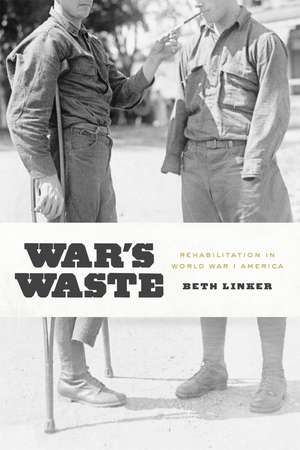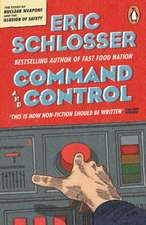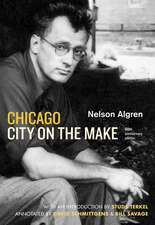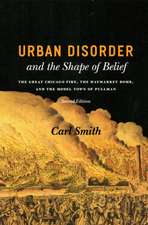War's Waste: Rehabilitation in World War I America
Autor Beth Linkeren Limba Engleză Paperback – 26 feb 2014
With US soldiers stationed around the world and engaged in multiple conflicts, Americans will be forced for the foreseeable future to come to terms with those permanently disabled in battle. At the moment, we accept rehabilitation as the proper social and cultural response to the wounded, swiftly returning injured combatants to their civilian lives. But this was not always the case, as Beth Linker reveals in her provocative new book, War’s Waste.
Linker explains how, before entering World War I, the United States sought a way to avoid the enormous cost of providing injured soldiers with pensions, which it had done since the Revolutionary War. Emboldened by their faith in the new social and medical sciences, reformers pushed rehabilitation as a means to “rebuild” disabled soldiers, relieving the nation of a monetary burden and easing the decision to enter the Great War. Linker’s narrative moves from the professional development of orthopedic surgeons and physical therapists to the curative workshops, or hospital spaces where disabled soldiers learned how to repair automobiles as well as their own artificial limbs. The story culminates in the postwar establishment of the Veterans Administration, one of the greatest legacies to come out of the First World War.
Preț: 253.06 lei
Nou
Puncte Express: 380
Preț estimativ în valută:
48.42€ • 50.69$ • 40.30£
48.42€ • 50.69$ • 40.30£
Carte tipărită la comandă
Livrare economică 31 martie-14 aprilie
Preluare comenzi: 021 569.72.76
Specificații
ISBN-13: 9780226143354
ISBN-10: 022614335X
Pagini: 300
Ilustrații: 20 halftones, 1 table
Dimensiuni: 152 x 229 x 18 mm
Greutate: 0.4 kg
Editura: University of Chicago Press
Colecția University of Chicago Press
ISBN-10: 022614335X
Pagini: 300
Ilustrații: 20 halftones, 1 table
Dimensiuni: 152 x 229 x 18 mm
Greutate: 0.4 kg
Editura: University of Chicago Press
Colecția University of Chicago Press
Notă biografică
Beth Linker is associate professor in the Department of History and Sociology of Science at the University of Pennsylvania.
Cuprins
Introduction: The Roots of Rehabilitation
1 The Problem of the Pensioner
2 Reconstructing Disabled Soldiers
3 A New Female Force
4 Maximalist Medicine at Walter Reed
5 The Limb Lab and the Engineering of Manly Bodies
6 Propaganda and Patient Protest
7 Rehabilitating the Industrial Army
Epilogue: Walter Reed, Then and Now
Acknowledgments
Notes
Bibliography
Index
1 The Problem of the Pensioner
2 Reconstructing Disabled Soldiers
3 A New Female Force
4 Maximalist Medicine at Walter Reed
5 The Limb Lab and the Engineering of Manly Bodies
6 Propaganda and Patient Protest
7 Rehabilitating the Industrial Army
Epilogue: Walter Reed, Then and Now
Acknowledgments
Notes
Bibliography
Index
Recenzii
“Beth Linker has deftly and expertly woven together numerous historical strands to produce an important book deserving of a wide readership. Basing her work on a review of official government documents, popular literature, professional medical and military journals, and, where possible, the voices of soldier-patients themselves, Linker presents a thoughtful and balanced account of the origin, development, and legacies of army rehabilitation policies, practices, and programs. Because of its broad historical scope coupled with its probing scholarly analysis, War’s Waste ought to be rewarding for medical and military historians; historians of disability studies, gender, and technology; health and welfare policy analysts; American Studies scholars (especially those focused on the Progressive Era); and physical rehabilitation specialists—along with orthopedic surgeons and physiatrists who may be interested in the vocational roots of their respective professions.”
“In an erudite and gracefully written first book entitled War’s Waste, Beth Linker explores the cultural, political, and medical meanings ascribed to the rehabilitation of disabled soldiers and veterans during the World War I era. . . . Deftly wielding insights from the history of medicine, gender analysis, and historical institutionalism . . . War’s Waste will be standard reading for those interested in many different fields of historical analysis: modern medicine, the Progressive Era, disability, and the veterans’ welfare system. At a time when thousands of American veterans from the wars in Iraq and Afghanistan struggle with disability and rehabilitation, the cultural, political, and institutional foundations of their care—and its inadequacies—deserve this special attention.”
“War’s Waste is a well researched and deeply rewarding history of soldiers’ rehabilitation, noteworthy for both the clarity of the author’s prose and the persuasiveness of her arguments. . . . Beth Linker has written an invaluable and all too timely study, one that will interest historians of medicine, policy historians and disability scholars.”
“Reading Beth Linker’s excellent book on rehabilitation of American soldiers disabled in World War I is a thrilling experience.”
“This pathbreaking study opens up exciting avenues for future research.”
“Recommended.”
“[A] compelling study. . . . War’s Waste offers important insights into the developments of the ethic of rehabilitation in the Progressive Era and would be useful to any historian of the period.”
“A useful addition to the work undertaken in the study of disability as it relates to the First World War. Linker’s book is timely. It not only reveals a little-known area of history and war, but also highlights historical continuities surrounding concerns over the levels of support of those who were sent away to fight and returned maimed.”
“War’s Waste is a fine book. Linker has laid down her marker as an important scholar of keen ability and judgment in the field of medical history.”
“The rich and important history presented in War’s Waste is relevant to readers wishing to understand the roots of the specialty of rehabilitation medicine but more broadly will likewise be relevant to those interested in the influence of social and political factors on medical practices.”
“This book is not merely the latest contribution to the ever-growing body of scholarship on disabled soldiers and their rehabilitation. It is one of the most important and readable studies to appear in recent years. . . . War’s Waste plainly deserves to become core reading among scholars and to be read by a wider, nonacademic audience interested in learning about the social and cultural history of America during the Great War.”
“Wounded and dismembered soldiers have always excited anxieties among citizens, as well as governmental officials. Beth Linker’s history of the rehabilitation of American men wounded during World War I focuses on the politics of rehabilitation. Reconstructing men’s sense of their own manliness turns out to be as important as ensuring that they remain useful as workers and patriots. War’s Waste is a persuasive and eloquent account of personal and political struggles in the aftermath of war. A must-read for anyone curious about what happens when mutilated soldiers return home.”
“Carefully researched and compellingly argued, this is an important contribution to our understanding of the complicated relationships among public policy, orthopedic and rehabilitative medicine, and social values. Its relevance to today’s challenging realities makes Linker’s penetrating study of an earlier war relevant to a wide spectrum of potential readers.”
“War’s Waste describes the transformation of America’s veterans’ policy from pensions to rehabilitation. Beth Linker convincingly argues that the rise of orthopedics, physiotherapy, prosthetics, and the modern army hospital during World War I were all part of an ideological and policy backlash against the Civil War veterans pension system, and aimed to turn wounded soldiers into productive members of the labor force. Combining sophisticated analysis with highly readable prose, War’s Waste will appeal to historians and scholars of medicine, policy, disability, the body, gender studies, and World War I and military history.”
“This thoughtful, provocative, deeply researched and beautifully written study shows how the US government took responsibility for soldiers who were physically injured and maimed in World War I, and why there was support for government intervention. Linker’s answer, superbly dissected and presented, is that there was a brew of intersecting motives: from American ideals of masculinity, modernity, and militarism to work and self-reliance.”
“War’s Waste is far more than a work of medical history. It is also an important contribution to the political and social history of the United States. Linker’s account combines larger political and cultural issues with a careful description and analysis of day-to-day medical practices.”
“War’s Waste connects the history of medicine to the historical experience of disability. Beth Linker shows that World War I doctors developed new rehabilitation technologies they hoped would cure disability in response to the vast human and economic costs of the war’s new technologies of mass carnage. But soldiers with disabilities also played a key role in this medicalization. They rejected claims that rehabilitation produced quick cures, and they demanded additional medical and nursing treatment. Linker’s sensitive and moving examples bring to life the economic, gender, and race conflicts that shaped the first generation to experience twentieth-century rehabilitation.”












